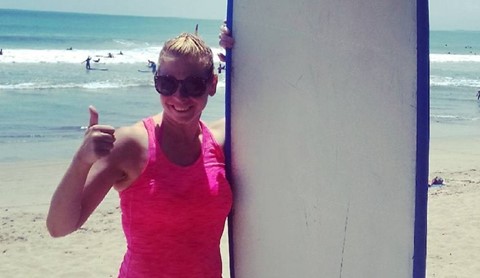Digital Health Researcher Stoked to Get Funding Award
Imagine lying on the most beautiful beach, listening to the roar of the surf. Your friends all grab a board to catch some waves, but you are left behind. You can’t join in the fun because you have a disability.
Not cool, huh? But it’s not only surfing: there are many people around the world who can’t participate in sport, or even essential living activities, because of a lack of disability specific equipment and accessibility aids. Fortunately, in this age of computer aided design (CAD), 3D printing and rapid prototyping, we have the power to create bespoke accessibility designs based on individual need at low costs.

Bristol University Digital Health CDT Research Associate, Dr Erin Dooley has recently been awarded an Engineering Faculty Post-Doctoral Research Prize for her research project The utilisation of 3D printing and rapid prototyping technology in adaptive surfing equipment design: a participant-led approach.
With the help of an undergraduate student, Erin hopes to use 3D design to develop a participant-led protocol for designing bespoke accessibility prototypes for surfers.
What was the inspiration for the project? Erin explains:
“I grew up surfing on the New Jersey shore, and later in Wales after moving to the UK. I was born with global development and motor-skill deficiencies and have experienced difficulties in both sport and daily living tasks. I’ve spent my life developing and sharing systems and hacks to navigate my disabilities, hopefully in the process helping others.
I was privileged to complete my PhD in Optometry and Tissue Engineering and volunteered with local surf charities Wave Project Cymru/Wave Project. I’ve found working with others in the disabled community very rewarding. I am acutely aware of the lack of services and support for the disabled community, especially when those services are not deemed to be ‘essential’,
My current research in the Digital Health CDT involves working with 3D Printing and Rapid Prototyping design. I aim to use these skills to develop protocols and equipment to help those with disabilities to better participate in sport. We are hoping that by working in conjunction with disability surfing and sailing charities we will be able to identify the need for a participant-centered design.
This process will allow individuals to find bespoke solutions for their unique needs and actively contribute to the design process, gaining valuable skills. We hope that once these protocols are established, we can make further inroads into assisting the wider disabled community."
The first phase of the research should be completed by the summer 2021, and it is hoped that this study will lead to further grant applications and research, possibly integrating digital technology and wearables into prosthetics and devices.
